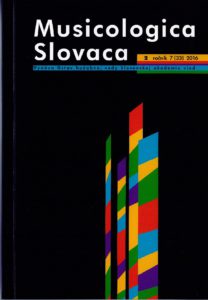
We kindly inform you that, as long as the subject affiliation of our 300.000+ articles is in progress, you might get unsufficient or no results on your third level or second level search. In this case, please broaden your search criteria.


Markéta Štefková (ed.): Edvard Grieg. Život a Dielo. Life and MusicBratislava: Vysoká škola múzických umení, 2016, 240 s. ISBN 978-80-89439-94-2
More...
Jiří Kopecký – Lenka Křupková: Provincial Theater and Its Opera. German Opera Scene in Olomouc, 1770 – 1920 Olomouc : Univerzita Palackého v Olomouci, Filozofická fakulta, 2015, 366 strán. ISBN 978-80-87895-52-8
More...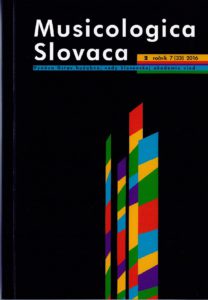
This article summarises the results of the latest research focused on the biography of the Slovak composer Tadeáš Salva (1937–1995). Salva is regarded as one of the most important figures in Slovak music in the second half of the 20th century. The research draws upon hitherto unpublished works, verifying the existing facts and presenting new information on the composer’s life. Tadeáš Salva was born in the village of Lúčky, where he spent his childhood and derived his first musical inspirations. During his music studies in Žilina, Bratislava and Katowice, and following their conclusion, Salva worked in various positions in institutions in Dolný Kubín, Liptovský Hrádok, Martin, Košice, Bratislava and Nitra. He died at the age of 57 in circumstances which have never been clarified. He is buried in his native village, on the plot belonging to his work studio, close to the family home.
More...
This article is devoted to the personal and professional relationship of Dobroslav Orel and Guido Adler. Both scholars had in common an interest in historical musical monuments. Under Guido Adler’s direction Orel gained a doctorate at the University of Vienna in 1914, became a member of the working team for the edition Denkmäler der Tonkunst in Österreich, and in subsequent years gave his teacher ongoing information about his research. Despite the fact that he did not complete his prepared edition Kodex Speciálník, Dobroslav Orel laid the foundations of Czechoslovak medieval studies with his further research, publications, and above all his teaching activity. Part of the correspondence of the two scholars is today deposited in the USA, in Guido Adler’s effects at the University of Georgia, while some written materials may be found in the effects of Dobroslav Orel at the National Museum – Czech Museum of Music. The correspondence with commentary, testifying to the mutual respect of the two scholars, which endured throughout a long period, is published in full for the first time.
More...

Review of: Janka Petőczová: Hudba ako kultúrny fenomén v dejinách Spiša. Raný novovekBratislava : Ústav hudobnej vedy Slovenskej akadémie vied; Prešov : Prešovský hudobný spolok Súzvuk, 2014, 383 s. ISBN 978-80-89188-40-6.
More...
Review of: Tatiana Pirníková: Umelec a intelektuál v zrkadle času. Premeny života a tvorby Ota Ferenczyho Prešov : Vydavateľstvo Prešovskej univerzity, 2015. 480 strán. ISBN 978-80-555- 1402-4.
More...
Review of: Soňa Burlasová: Naratívne piesne o zbojníkoch. Príspevok k porovnávaciemu štúdiu Bratislava : Eterna Press – Ústav etnológie SAV, 2015, 119 s. ISBN 978-80970975-4-7
More...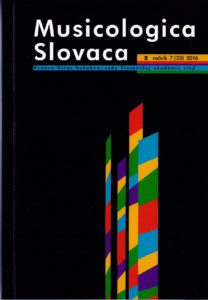

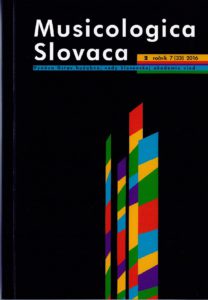
The literary remains of Karol Plicka (1894 – 1987) have been lodged since the second half of the 1980s in the Slovak National Museum in Martin. The paper is devoted to the history and the current state of the remains, describes the manner of their processing and identifies their content. It is centrally concerned with providing a picture of the manuscript notebook records of Slovak folk songs, which form the core of Plicka’s literary remains.
More...
Jozef Kresánek (1913–1986) is regarded as a founding personality of Slovak ethnomusicology. His individual profile is revealed in the light of the essential activities which define the ethnomusicologist’s activity: from field and archival research, through work with the material, to scholarly reflection. In terms of researching Slovak folk music, his individual image corresponds with the profile of the European musical folklorist of the first half of the 20th century. Kresánek, however, outgrows this profile insofar as he managed to integrate folk music into wider contexts of historical development, style, genre, and aesthetic theory. Kresánek’s ethnomusicological work was directed towards the comprehension of “Slovak folk musical thinking”. In his musicological work as a whole, however, this was only a preparatory stage for the formulation of a universalist concept of musical thinking. Within this concept folk music too had an important part to play, viewed from the perspective of an ethnomusicologist who had emerged from the European tradition of this discipline.
More...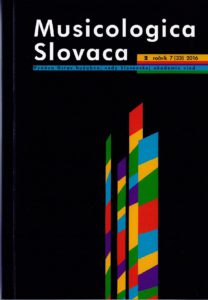
The manuscript textbook Anleitung zum Klavierschlagen by Michal Godra is a type of the textbook for elementary instruction in piano playing in the first half of the 19th century in Slovakia. It is divided into a theoretical and a practical part. The theme of this paper is presented in terms of the development of piano playing and the methodology of instrument playing, the musical genre characterisation of the compositions included in the practical part of the textbook, and the degree of influence by Franz Paul Rigler’s theoretical works. M. Godra’s piano school is an important source of knowledge of the development of musical education and piano composition in the given period in Slovakia.
More...
The paper contains new information about the positive organ in the village of Sása (district of Revúca). The following facts were determined by analysis: the identity of the organ-builder Michal Kiszely; an approximate dating of the instrument’s construction to the 1820s; and the instrument’s precise disposition. Examination of the scaling of all registers showed a resultant scale proportion of 5:8, and also a secondary raising of the cut-up in all registers. From material research of the wooden registers it was found that resonance wood was not used; the resonant Norway spruce was used for a small part of pipes. This material will enable us to date the instrument’s construction with the help of dendrochronology. The metal registers from the organ’s metallic part are composed of an alloy in the proportion of 65% tin and 35% lead. Apart from degradation by woodworm, the original intonation also has suffered damage, as shown by analysis of the frequency spectrum of sound in all registers. The pitch needs to be retuned in the wooden as well as in the metal registers. Our summary organological findings concerning this instrument can be used in further application outputs.
More...
The liturgical handbook Manuale musico-liturgicum (Editio latino-slavica) by František Žaškovský (Eger 1853) is the second published Latin-Slovak ritual, after the Cantionale Ritualeof 1681 by the Piarist Father Mikuláš Hausenka. The handbook contains liturgical chants and songs for the most important Holy Days and church ceremonies and is designed for organists and singers in the choirs of parish churches. It also includes 31 hymns to Slovak texts, of which 9 have organ accompaniment and two are adaptations for four voices. The editor, together with his brother Andrej Žaškovský, adopted and modified some hymns from older Slovak hymnals. Apart from that, they also created some texts and tunes of their own. The Slovak Catholic hymns with organ accompaniment had been published for the first time in 1847 (Martin Eliáš). As compared to M. Eliáš, the Žaškovský brothers worked out their organ accompaniment to the hymns in a more modern manner, using organ interludes in the mode of figurative passages between the lines or musical phrases. They attempted to resolve these interludes variably, in an attempt to avoid triviality and mannerism. Their ideal was rather a classical moderation and sense of proportion, and in this they stand somewhere between the classical school and the new sound ideal of another generation of organists in the second half of the 19th century.
More...
The piano had an important status in the life and music of Viliam Figuš-Bystrý (1875–1937). The instrument accompanied him all through his life, and almost every day he played for enjoyment and for purposes of study and composition. In the places where he held professional positions, besides performing as choirmaster and conductor he also accompanied singers and instrumentalists. He also played as a member of the chamber groupings which he himself formed and for which he adapted works principally from the repertoire of European classicism and romanticism. In the conformation of his work there are also compositions for piano – dances, compositions for children and youth, and the Sonata in the Doric Scale, op. 103. His repertoire and his own compositions complement our findings on the technical and expressive maturity of Figuš as a performer, and also as a composer who took the compositional resources of late romanticism and expressionism as his starting-point, but relocated them in the style of musical symbolism and the Secession. Figuš’s piano work, extant programmes of events, and his personal diary round off the hitherto-received picture of the composer and of the musical taste and production of his time.
More...
Ivan Krasko (1876 – 1958), own name Ján Botto, is regarded as the leading figure of literary modernism in Slovakia. His poems have been set to music by several Slovak composers, with most of these adapted poems being taken from Krasko’s best-known collection, Nox et solitudo (1909). This work was drawn upon by composers from different 20th century generations, ranging from the older generation of composers, through the adherents of musical modernism, to the representatives of New Music. The aim of the paper is to present Krasko’s poetry in works for vocals and piano by Mikuláš Schneider-Trnavský (1881 – 1958), Eugen Suchoň (1908 – 1993) and Tadeáš Salva (1937 – 1995), highlighting the genesis of the works studied, their status in the context of these composers’ work, and their artistic significance, using semantic-structural analysis.
More...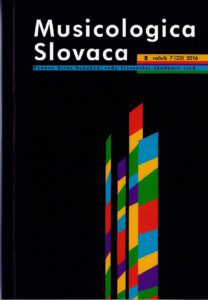
Review of: Lubomír Spurný: Heinrich Schenker (1868 – 1935): Kapitoly z hudební teorie a analýzy. Praha : KLP – Koniasch Latin Press, s. r. o., 2012, 174 s. ISBN 978-80-86791-12-8
More...
Review of: Krekovičová, Eva – Potančok, Vladimír (Ed.): Personálna bibliografia PhDr. Sone Burlasovej, DrSc. Bratislava : Eterna Press; Ústav etnológie SAV, 2013, 56 s. SBN 978-80-969259-7-1.
More...